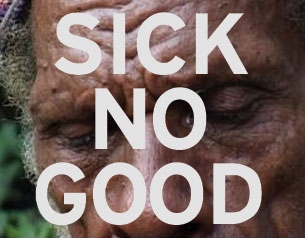Sick No Good
Papua New Guinea is sliding towards disaster. A culture of gang violence, lawless suburbs and impoverished settlements has led to it having one of the fastest growing HIV infection rates in the world.
 Papua New Guinea is sliding towards disaster. A culture of gang violence, lawless suburbs and impoverished settlements has led to it having one of the fastest growing HIV infection rates in the world. Unless effective action is taken soon, 50% of the population could be wiped out. This week's documentary hears from the people caught up in the epidemic. From gang members bragging about unprotected sex to AIDS victims abandoned by their families, it's an intimate look at a society on the verge of breakdown.
Papua New Guinea is sliding towards disaster. A culture of gang violence, lawless suburbs and impoverished settlements has led to it having one of the fastest growing HIV infection rates in the world. Unless effective action is taken soon, 50% of the population could be wiped out. This week's documentary hears from the people caught up in the epidemic. From gang members bragging about unprotected sex to AIDS victims abandoned by their families, it's an intimate look at a society on the verge of breakdown.
Gerehu used to be a pleasant district in the capital of Port Moresby. Then it was taken over by gangs. Now police rarely venture here: unemployment is rife and crime is the major occupation. "The system just dropped us. Our parents aren't working so we learned we have to turn to crime."
For members, gangs provide much needed security. "It's to do with our day-to-day survival", explains Morgan. One way members can improve their status is by having lots of sexual partners. And part of this macho gang culture is sexual violence. "Sometime we raid a house, see a mother or girl, rape them up", brags another member. A third of all women in PNG have been sexually assaulted.
Most people have little understanding about AIDS. "I heard there's a cure - some root of a tree", states brothel owner, Jerry. When he remembers, he encourages clients to use condoms. "But some times, I'm so busy there's no time." Despite the fact his brothel is a known AIDS hot-spot, he regularly offers girls as prizes and tells his workers not to worry about HIV.
It's estimated there are more than 100,000 HIV patients in PNG and the infection rate is increasing. "We could lose 50% of our population", fears Dr Benare Bun from the Parliamentary AIDS Committee. But despite this, there is still no dedicated AIDS ward. The nation's health system can't cope and doctors routinely run out of basic supplies. "I don't have enough sheets. We're always running out of medicine", complains Sister Elizabeth Waken. The hospital can't even afford to feed patients.
And then there's the stigma. In isolated areas, people with AIDS have been burnt or buried alive. "Sorcery is a great problem", explains Sister Rose Bernard. "Some don't accept it's the AIDS virus that's killing people so they claim sorcery." Those accused of being a sorcerer are then murdered. "Many innocent, innocent people are being killed", lament Sister Rose Bernard.
But amidst the sad stories, there is one glimmer of hope. Five years ago, HIV patient Maura Mea started challenging the way AIDS patients were treated. She confronted the rapists and started talking to them, educating them about the dangers of HIV. "I explained how HIV can be transmitted in gang rape." Now, there hasn't been a rape in her community for two years. Rates of unprotected sex have also fallen.
Unfortunately, cases like this are rare. For the spread of AIDS to be halted, the government has to take effective action. And - for the moment - the war against AIDS is being lost.
FULL SYNOPSIS
